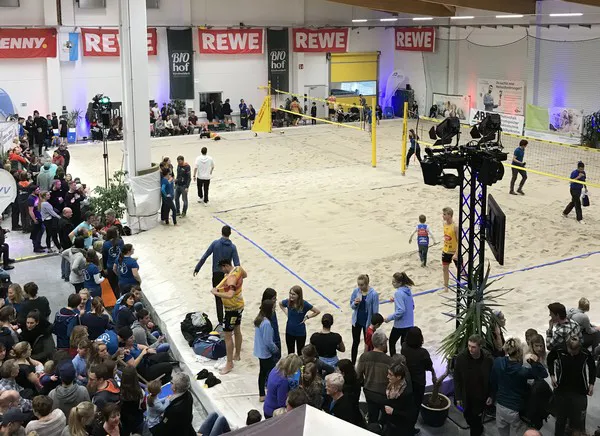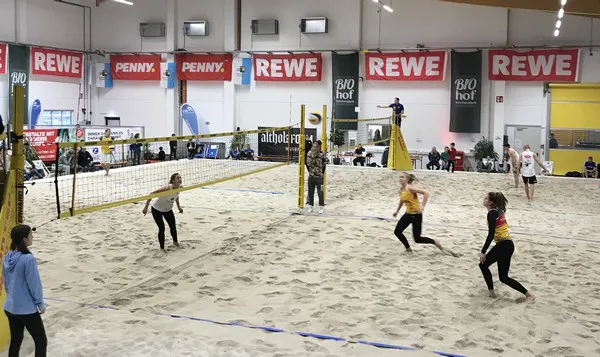One year ago, BIOhof in Kirchweidach was ceremonially opened under the direction of Florian Steiner. It was an exciting year for the young entrepreneur who grows organic tomatoes, cucumbers and peppers on 60,000m² of land. Although the Steiner family has been active in greenhouse cultivation for a long time, there were still some challenges and insights from the project. We spoke with Florian Steiner about his first year of production.
The guests of honour at last year's opening. Photo: Rosmarie Daubenmerkl (REWE)
"We can be quite satisfied with the first year. We have started with a completely new team, so it will of course take a little time until all the mechanisms work together. We are pleased to be able to go into this season with a well-rehearsed team," he says.
The ground is the most important asset, he says: "The ground is and will remain a constant challenge. We have tried out everything to create the best possible soil. Our home-made compost, made from plant residues and organic sheep's wool pellets has proved its worth."

The grower grows his organic vegetables for the REWE and Penny partners: "Together we are always looking for new, innovative varieties. The main focus is on the taste and quality of the fruit". This year, he said, he has again grown several trial varieties that may make it onto the vegetable shelf next season.
Regionality and sustainability remain the major factors on the German market: "We are already noticing that people are placing even more value on regionally produced food. We hope that this positive trend will continue in the long term. Another trend is the topic of sustainable packaging and plastic avoidance. Together with REWE, we have converted all our articles to packaging without any plastics. We are proud to make a contribution to the avoidance of plastics and the conservation of resources."

Florian is not planning to expand his production area for the time being: "For our organic farm, the area is well adapted to the Bavarian market, so we have no new projects planned at the moment". His brother Wolfgang, on the other hand, is currently expanding the conventional cultivation area of his farm by 4.5 hectares under glass in neighbouring Emmering. "This will be the first tomato greenhouse in Germany to rely exclusively on LED lighting. This will enable us to meet the demand for domestic tomatoes during the coming winter months."
Illuminated cultivation is playing an increasingly important role in greenhouse cultivation and can make a significant contribution to increasing production. Steiner knows that this technology is not suitable for organic cultivation. Therefore, it is necessary to diversify through other channels: "Artificial lighting in organic cultivation is not really an issue. Among other things, it is not allowed by the guidelines of the organic farming associations. In order to stand out from the competition, we at Kirchweidach focus on taste and top quality. Many clients appreciate this and we are able to avoid price wars with cheap imported goods." Geothermal energy plays an important role in the BIOhof's sustainability strategy: "Here in Kirchweidach we obtain our heat from the neighbouring geothermal energy, so we have a secure and sustainable source of energy for the future."

Unfortunately, such large-scale projects do not always meet with the approval of the population, especially in smaller communities. The Steiner family has therefore always done public relations work to bring their work closer to the people in Kirchweidach and the surrounding area. From guided tours to beach volleyball tournaments - the Steiner's are trying to be involved.
"Transparency and a close tie to the community and the surrounding population is very important to us. At our open day, for example, all Kirchweidachers were able to get an idea of our greenhouse and our production methods. The beach volleyball tournament was born from a joint idea with the volleyball club of the Kirchweidach community. The Kirchweidach volleyball players were of the opinion that our packaging hall is ideally suited as a beach volleyball court in winter. As it turned out, they were right. The volleyball players and the Oldtimerclub Kirchweidach created one of the greatest indoor beach volleyball championships in Germany," Florian Steiner says proudly.


Due to the current COVID restrictions, it is impossible to organise events like this in the foreseeable future. However, the company is trying to use social media - Facebook and Instagram - to give an insight into what is happening. The year 2020 went very differently than expected for many companies. By employing workers all year round, at least the problems of labour shortages could be averted.
"To prevent corona, we have implemented numerous measures to protect our employees. To keep contact between employees as low as possible, they were divided into small groups with different working and break times. Additional disinfectant dispensers were installed at the company and in the company apartments, and very close attention was paid to the minimum distance and the obligation to wear masks. We are very happy that, so far, none of our employees has been infected with the virus."
For more information:
Florian Steiner
BIOhof Kirchweidach GmbH & CO KG
Glocken 3
84558 Kirchweidach
Bayern, Deutschland
+49 8623 / 985 06 13
Mail f.steiner@biohof-kirchweidach.de
Web www.biohof-kirchweidach.de
